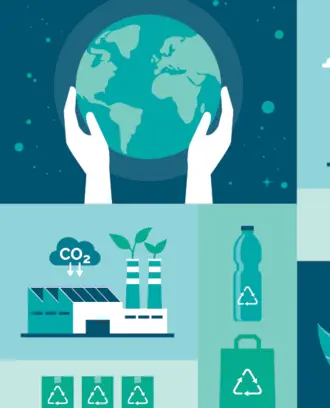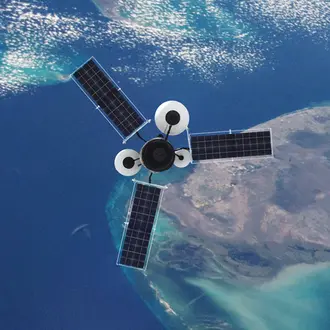Juliana Kerrest, MBA ’18, isn’t afraid to try new things.
Juliana Kerrest, MBA ’18, Chief People and Sustainability Officer at Nuru
After graduating from MIT Sloan and the Harvard Kennedy School and earning the MIT Sloan Sustainability Certificate, Kerrest dove headfirst into a new career in the Democratic Republic of Congo, a country with a completely different culture and business landscape than in the United States. She is currently the chief people and sustainability officer at Nuru, a startup utility company dedicated to bringing affordable electricity to Congo. In this role, she oversees human resources, ESG, and marketing. Kerrest has also previously served in the roles of chief of operations and financial management and director of finance at Nuru.
“If an opportunity comes along that’s unique enough and where you’re going to find fulfillment, definitely take advantage of that,” Kerrest advised MIT Sloan students at a November Sustainability Initiative Lunch Series session titled “Lighting the Way: Sustainability + Development.”
Presented in collaboration with Sloan Entrepreneurs for International Development (SEID), the program highlighted Kerrest’s extraordinary perspective on working with a startup in a foreign country. In a conversation moderated by LGO candidate Andrew Epstein and MBA candidate Nisha Patel, Kerrest shared how her role at Nuru enables her to use her passions for sustainability, cross-cultural understanding, and entrepreneurship to serve the people of Congo.
Finding her passion
Kerrest didn’t always want to pursue a career in sustainability. She originally entered MIT Sloan with the intent of studying entrepreneurship in emerging markets. Inspired by MIT Sloan’s culture of academic curiosity, she enrolled in some sustainability courses that piqued her interest.
“Part of what MIT Sloan and MIT encourage you to do is explore new avenues and new opportunities,” Kerrest remarked.
Kerrest had been a longtime advocate for social justice causes, including animal rights, women’s rights, and refugee and resettlement issues. After realizing how much sustainability impacts all of these causes, she signed up to complete the Sustainability Certificate. This newfound interest led her to complete two internships focused on sustainability, one of which was in Congo. It was there that she came face-to-face with the fact that only 19% of the people there have access to electricity.
Enter Nuru. Nuru provides solar energy to some of the poorest neighborhoods in Congo through their use of mini-grids. Like Kerrest, Nuru is not afraid to explore unknown territory. They deployed the first solar-based mini-grid in Congo in 2017. In February 2020, they launched a 1.3MW solar hybrid site in Goma, then the largest solar hybrid off-grid mini-grid in sub-Saharan Africa. Nuru will soon begin construction on sites that will supply 13.7MW across three new sites in Congo.
Nuru uses innovative ways to make this solar energy more accessible and affordable to their clients. They serve both large companies as anchor clients as well as households and smaller businesses. Households and smaller businesses pay in advance for a couple of days’ worth of electricity instead of paying a bill in advance for a longer duration of power. Nuru enables these customers to pay them through their mobile phones or in person through third-party vendors. They also have a customer care center open every day to assist their clients.
“Our clients really come first and we’re always going back to the client experience, always thinking about really raising the bar,” explained Kerrest.
A culture of learning
Part of enhancing the client experience involves being open to learning about Congolese culture and embracing the challenges that come when working in a cross-cultural startup. There are bound to be certain misunderstandings that arise during conversations with clients, organizational partners, and co-workers from a different culture. Kerrest says that it is important to approach these conversations with openness and honesty.
“There’s always new things I’m learning, and I think it’s approaching things with an open mind and an open heart so that when misunderstandings come up or things are lost in translation, there’s an understanding between you and the person you’re working with that there’s no ill intent behind it,” said Kerrest.
Nuru also makes good on its commitment to the Congolese people and culture in their hiring practices. As part of her role overseeing Nuru’s HR, Kerrest makes sure to prioritize hiring Congolese talent. Nuru also encourages employees who are based in other parts of the world to move to Congo. Kerrest herself has lived in Congo throughout her Nuru career.
Despite having moved up the ranks at Nuru, Kerrest understands the value of learning from employees who are both senior and junior to her. She explained that working at a startup typically involves a large learning curve. Early in her career at Nuru, she had to learn about both financial modeling and the broader field of solar energy while on the job. She credits her co-workers with helping her to develop the skills to succeed at Nuru.
“There’s a lot that we have that we can share and that we can teach other people,” Kerrest said of having an MIT Sloan education. “But remember how much we still have to learn from other people, regardless of their educational background or where they are in their professional career."



